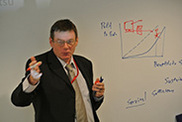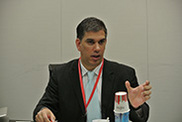Archived content
NOTE: this is an archived page and the content is likely to be out of date.
FY 2012 Stakeholder Dialogue (BOP, Inclusive Business)
Discussion with guest experts on BOP and inclusive business
The Internet is creating new opportunities for its 2.4 billion users worldwide. However, these opportunities can be lost amid information disparities (digital divide) in developing countries where ICT infrastructure is inadequate.
The Fujitsu Group has declared its intent to take on the challenge of changing society by 2020 through the "Three Powers of ICT." With regard to one of these, "The Power to Provide Equal Opportunities to All People," the Fujitsu Group is undertaking partnership development and field surveys aimed at developing countries. To help put this into concrete practice, Fujitsu invited global experts to a discussion on the theme of "Cultivating the BOP market (Prospects for the Future)." An overview of the discussion follows.
Date held: February 27, 2013
Participants:
Experts
Armin Bauer, Senior Economist, Asian Development Bank
Robert de Jongh, CEO, Red Mantra Group
Fujitsu
Kanji Hayashi, Head of NTT Data Global Business Unit
Mikito Kiname, Executive Vice President, Marketing Unit
Yoshihiko Tokumaru, Corporate Senior Vice President, Fujitsu Research Institute
Takafumi Ikuta, Senior Research Fellow, Economic Research Center, Fujitsu Research Institute (secretariat)
Sogo Fujisaki, Director, CSR Department (secretariat)
* The positions and titles of participants are as of the time of the dialogue.

Key comments by the participating experts are as follows.
Key comments by experts
 Dr. Armin Bauer
Dr. Armin Bauer
When conducting business in the BOP market, a company should not only make efforts to sell ICT systems and devices but should also consider who will use the provided goods and services and for what purpose, as well as how this will benefit society. Most Japanese companies, including Fujitsu, tend to focus only on the top tier (top-level companies and the government) as clients. ICT has the power to resolve many of the problems of developing countries. I think that adding "for BOP" to the end of Fujitsu's declaration of "The Power of ICT" can reform the company's conventional thinking about business.
 Robert de Jongh
Robert de Jongh
To use ICT in resolving the social issues of developing countries, the presence of partners (governments, NGOs, etc.) well versed in the local issues is important. Even if the return on a project is minimal at the time of launch, a high degree of social contribution will lead to an improvement in reputation and return for the company in the long run.
When entering business in developing countries, it's vital to take the approach of not only committing low-cost products to the BOP market but also providing systems that comprehensively resolve social issues.
The Fujitsu Group, drawing on the expectations and requests of outside experts, will make efforts to create mechanisms that promote the diffusion of ICT so that as many people as possible worldwide can open the door to cyber society and enjoy the benefits of ICT.
Participant profiles
Armin Bauer
Armin Bauer is a Principal Economist at the Asian Development Bank (ADB). Mr. Bauer has been with ADB since 1995 in various functions in the operational, strategy and policy, and knowledge management departments. One of Mr. Bauer's recent initiatives is a collaboration with ADB's Private Sector Department and the Inter-American Development Bank (IDB) on promoting inclusive business investments in various Asian countries. The initiative comprises (a) market scoping studies in 10 Asian countries on inclusive business at the base of the pyramid, (b) the development of an inclusive business impact assessment tool, and (c) the possible establishment of investment facilities for inclusive business in cooperation with development partners. Mr. Bauer has more than 20 years of development experience, a Ph.D. in development economics, an M.A. in Political Economy (1987), and a BA in Administrative Science.
Robert de Jongh
W. Robert de Jongh is currently the Founder, CEO and Chief Inclusion Architect at the Red Mantra Group, a boutique strategy consulting, market research, and ideation company focused on inclusive growth, sustainability and accountability in emerging markets worldwide. He is currently Regional Team Leader and Inclusive Business Development specialist at the Asian Development Bank, where he currently manages a portfolio of inclusive business and impact investing initiatives including fund design, market feasibility studies, and a strategic knowledge exchange with the Inter-American Development Bank. Mr. de Jongh is also leading an inclusive business * development and engagement strategy for the poorest regions in the United States for the Ford Foundation. Mr. de Jongh is a graduate of the American University in International Studies and Development Economics in Washington, D.C. and completed EU policy studies at the Universite Libre de Bruxelles in Brussels, Belgium.
* Inclusive Business
-Inclusive business is a sustainable business model that targets poor and low-income people ("base of the pyramid," BOP) in emerging and developing countries, resolving regional social issues while securing revenue for companies.
-Inclusive business seeks to create a value chain by viewing the poor not only as consumers but also as suppliers, sellers, and laborers. It has gained attention as an approach for cultivating growth markets in emerging and developing countries such as African countries and India.
